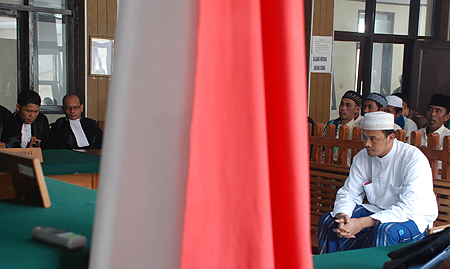
Idris (R) An Indonesian Muslim accused attacking Ahmadiyah sits waiting for his verdict at the court room in Serang, Indonesia’s Banten province July 28, 2011. (Photo: Aulia Pratama / Reuters)
Less than six months after a hundreds-strong mob beat members of a minority sect with machetes, rocks and bamboo poles, killing three, the leaders of the barrage will walk free. The attack, which took place in a remote village in Banten province, was captured on video. Yesterday, at a heavily fortified courthouse outside the capital, the twelve men convicted in the case received sentences of just three to six months. Dani bin Misra, a young man filmed smashing the skull of a limp, bloodied body, got three months for public incitement. Both local and international observers have questioned the impartiality of the investigation, the trial and the sentences. But the government won’t back down.
On Friday, Indonesia’s minister of religious affairs, Suryadharma Ali, told TIME that he was “not in a position to judge the fairness of a court result,” but he believed the country’s judges were both willing and able to enforce the law. He also defended a decree, issued in 2008, that prohibits members of Ahmadiyah from practicing their faith in public or spreading their beliefs. Ahmadis believe their sect’s founder, a 19th century Indian named Mizra Ghulam Ahmad, was a prophet. Many Muslims, including the minister, consider this claim heretical. He said that although he supports freedom of religion, Ahmadis ought not use that freedom to “completely modify” Islam’s core beliefs.
Critics counter that the government’s stance, and the recent trial, privilege religious doctrine over basic rights, threatening the country’s proud tradition of pluralism. Human Rights Watch called it “a sad day” for Indonesian justice. The United States issued a statement saying it was disappointed by “the disproportionately light sentences.” It also called on Indonesia to “defend its tradition of tolerance for all religions.” The chairman of one of the country’s largest Muslim organizations, Muhammadiyah, also spoke out. “The punishment is too soft,” Din Syamsuddin told the Jakarta Post. “That hurts me.” No doubt it hurts the country, too.
More: Read about Indonesia’s religious revolution.
Emily Rauhala is a writer-reporter at TIME. Find her on Twitter at @emilyrauhala. You can also continue the discussion on TIME’s Facebook page and on Twitter at @TIME.

